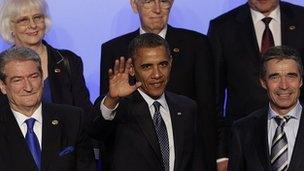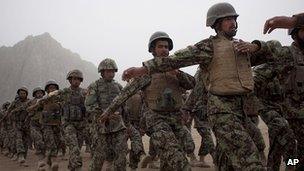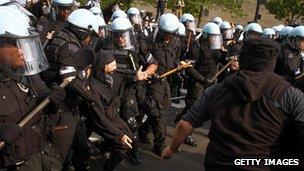Mission, sort of, accomplished
- Published

President Obama says there will "hard days ahead" in Afghanistan
You won't hear anyone say "mission accomplished". That was the banner that hung behind George W Bush on an aircraft carrier as he declared the Iraq war won. Just before it spiralled into chaos.
But the message that the leaders want to go out from the Nato summit is that war is, nearly, over. For the West at any rate.
It hasn't been won but the mission is, sort of, accomplished.
That doesn't mean we are leaving Afghanistan in the lurch. Far from it. It is a difficult, nuanced, some would say contradictory, message.
One of the stories about war that has always haunted me is that of World War I soldiers fighting and dying, external as the clock ticked down to the war's end. The armistice agreement, external, signed six hours earlier, was the designated time when their political masters had decided the slaughter would stop.
I have been asking some of those involved whether the end in Afghanistan amounts to a prolonged version of much the same thing.
For the next two years British and American soldiers will be risking their lives for a war that we know will end in 2014, no matter what.
Has Nato masterfully spun an acceptance of defeat and subsequent retreat into something that looks a bit like victory?
Surprisingly frank
The 1st Brigade, 1st Armored Division may bear the brunt of the final fighting. They will be among the last troops going over to Afghanistan, some time in the autumn.
They have been training at Fort Bliss in Texas, practising operations in mocked-up Afghan villages, charging from helicopters but encountering people posing as innocent locals.
Some of them were surprisingly frank when they spoke to my colleagues about fighting at the fag end of a war and handing over control to others.
Here's a selection of quotes:
"It has pros and cons, it kind of sucks that it's the end, we may get stuck doing details and closing up, packing up to go home - but on the other side, we get closure. It's not like we're going to leave things half done.
"It's an interesting idea [transferring power to Afghans]. On paper I think it's a good idea to get everyone involved - everyone feels like they have a piece of solving the problem - but in reality, I think it'll probably be a mess."

The Afghan National Army is being prepared to take over combat duties
"I do think they want to be 'there' and I think the effort is going to be there - my only concern is, is the government of Afghanistan gonna be there? With pay, with material, with equipment and that kind of thing."
"Instead of fighting the Taliban, now it's about bringing home as many people as we can.
"We're not fighting a conventional army like World War II or Korea, now we're fighting an ideal, so… you can't really destroy the ideas that we're fighting against so even once we leave it's going to be a conflict that continues."
So is this just about winding down a war that cannot be won?
President Obama's national security adviser, Ben Rhodes, told me: "You have to keep in mind what the core objective was when we went to war in the first place. It was to defeat al-Qaeda and deny them a safe haven. We've actually made tremendous progress towards that goal in the last two or three years.
"What we need to do now is make sure Afghanistan cannot re-emerge as a safe haven for al-Qaeda.
"It is not going to be a perfect place, it's not going to be a Western-style democracy. When we leave, there are still going to be elements of violence."
But isn't it just odd to go on fighting a war that you are going to end?
Ben Rhodes says the experience of Iraq has been important.
"Without a timeline you can't transition to foreign security forces being in the lead. A timeline is necessary to discipline this process and make clear the schedule under which they are going to take responsibility for their own security and then allow us to plan the draw down of our own forces."
It seems obvious to me that Obama has been pretty hard-headed, deciding to end a war when it was clear to him that it couldn't be "won" in a conventional sense.
This view is supported by an important article by David Sanger in the New York Times, external.
Sanger's record is impressive. He gets the inside story more often than any other Washington journalist. He says that after a year in power, Obama decided that remaking Afghanistan was a fantasy and that his generals shouldn't be allowed to push him to give them more time, so the decision to pull out was taken without them.
The man who stood against Obama in 2004, John McCain, thinks it was a basic mistake to set a deadline for the end of the war.
He told me: "I hate to be bound by dates, because it is not dates but conditions on the ground that dictate. I think that [the 2013 handover] would have been much more likely if the president hadn't drawn down earlier despite the objections of his military commanders."
He is heartened by the strategic agreement with Afghanistan, which will last for 10 years, but feels the president's stress has been all wrong.
"All he is doing is talk about withdrawal, getting out. All of us, Americans and Europeans, are war weary.
"That is why it requires a president of the United States to explain to people why we cannot allow Afghanistan to return to what it was on 11 September 2001. It requires presidential leadership. This president is MIA [Missing In Action]."
The many anti-war protesters who gathered on the streets of Chicago believe the real problem is the exact opposite.

The Nato summit has attracted many anti-war campaigners to Chicago
Among them is Occupy Washington's Kevin Zeese. He says soldiers are going on fighting their way towards a deadline for one reason.
"That's what happens when you lose a war. It is like Iraq. This is how you get out when you lose."
He thinks that French President Francois Hollande has got it right, and Obama has it wrong.
"He is signing an agreement that will keep us there until 2024, he has already signed that agreement. It will need troops there for a long time.
"We are the bull in the china shop, until you get the bull out of the china shop you can't fix the china shop. We need to leave as quickly as possible, a rapid exit."
The dangers of setting a deadline for ending a war, to bring the troops home by a specific date on the calendar are legion.
It hasn't quite dawned on many people what it will feel like to be in harm's way (even if not in "a lead combat role") just months from the end of the effort.
But President Obama and the other leaders have decided this brutal clarity is necessary so people at home understand the war really is almost over.